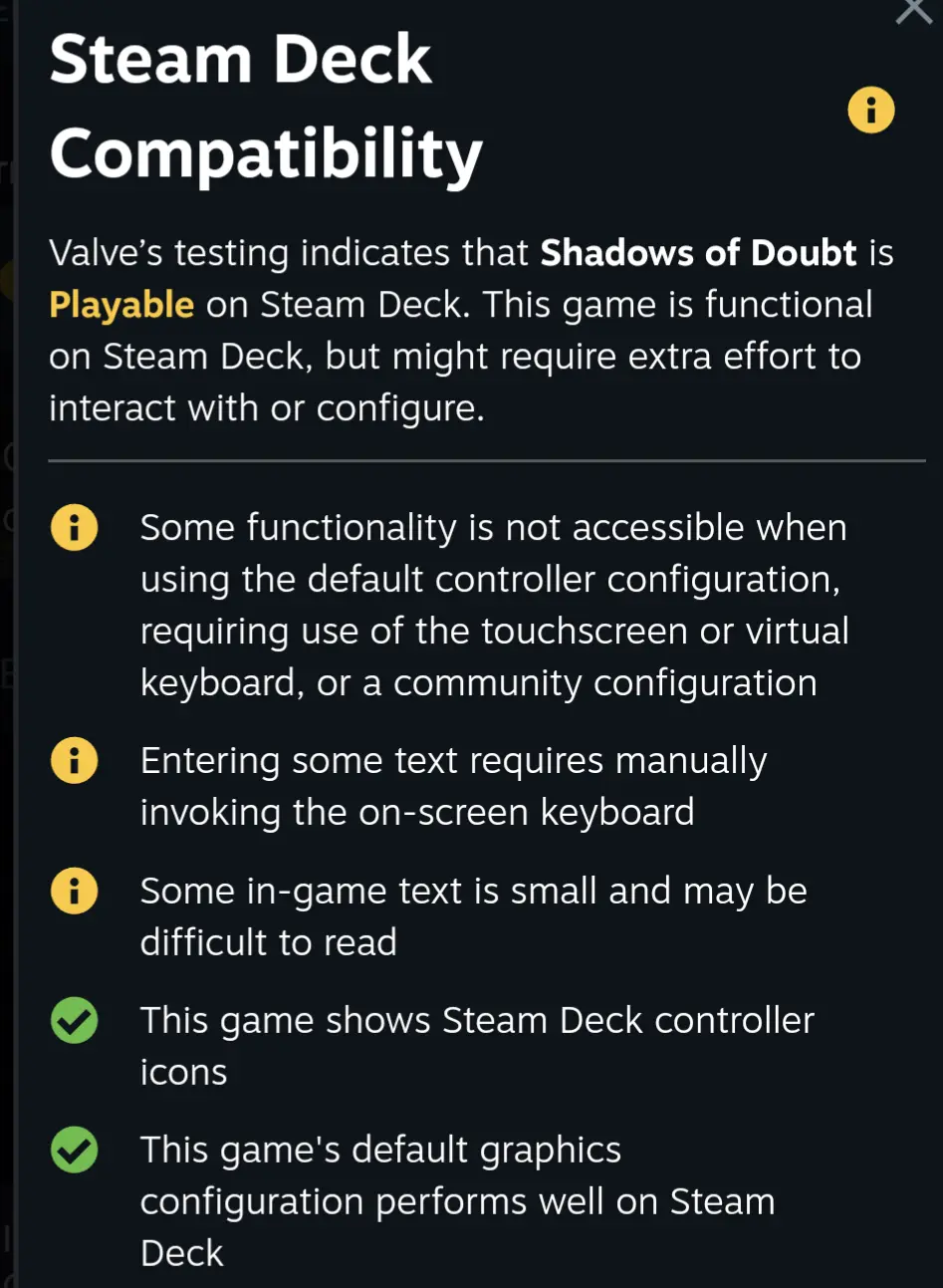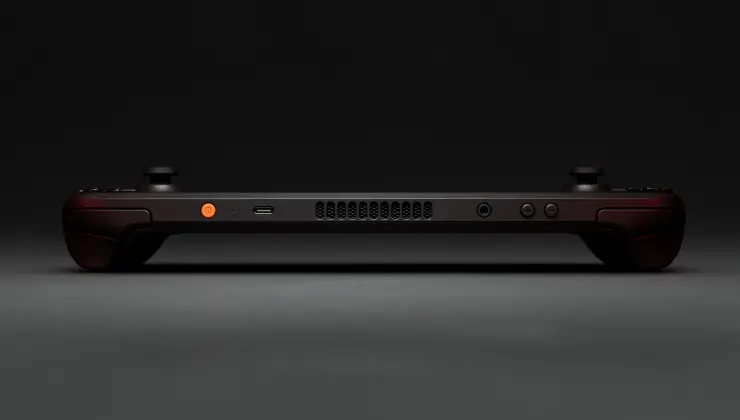- cross-posted to:
- pcgaming@lemmy.ca
- gaming@lemmy.zip
- cross-posted to:
- pcgaming@lemmy.ca
- gaming@lemmy.zip
Of course there are many non-verified games that run fine as well.
For comparison, the Switch has somewhere between 5,000 and 10,000 games.
Source: Wikipedia lists about 5000, Nintendo says “over 5000”, but this website claims 10,880. Part of why the Moby Games website lists more is because it lists multiple versions of a game as separate games (Xenoblade DE is listed 4 times for example).
It’s so great to see how well proton supports so many games compared to 2018. A year later and more games are running, but many with terrible stuttery fps. Now it all works except for anti-cheat because of those terrible cheaters.
Now it all works except for anti-cheat because
of those terrible cheaters.publishers are too cheap to pay for dedicated authoritative servers, instead relying on P2P networking that blindly trusts other clients’ game state updates.FTFY
I’m not even sure that is true.
There are always ways around anticheat. Why do companies demand Ring 0 access anyway?
One of the reasons Vanguard is so effective is that it starts early during boot, which makes it more difficult to develop a cheat. This also results in Vanguard running all the time, unless someone wants to reboot to play Riot’s games.
All anti cheat can be circumvented, and platforms are different to what extend they want to allow access to the system. Even macOS doesn’t allow such deep access like Windows does, but it also limits access in general.
It’s great that on Linux ac are limited to userspace. Userspace anti cheat with server side ac works well enough for games like Overwatch in my experience.
Nice write up, but it doesn’t touch my question.
There are cheats that only read the screen, they don’t even need to run on the same PC.
So why kill your customers with anticheat acting like a spyware for something they will never solve.
You could say the same about door locks. It’s not going to stop a thief who wants to get in from getting in. So why even have a lock on the door? Because it will prevent nosey people from getting in.
Similarly anticheat won’t prevent anyone dedicated to cheating, but it does prevent the “script kiddies” who would cheat if it was super easy.
There are always ways around anticheat. Why do companies demand Ring 0 access anyway?
Because it makes detecting cheats running on the same machine easier. Sadly many companies don’t care much about it’s users privacy and security ideals.
So why kill your customers with anticheat acting like a spyware for something they will never solve.
Sadly there’s enough people/content creators who ask for kernel level anti cheats. It comes up from time to time in Overwatch and CS communities, especially the latter. The amount of people like us, who purposely don’t play a game for it’s invasive ac is likely really small.
People go and play CS checking whether the enemy is likely cheating, while people are playing Valorant believing cheaters will be detected. This makes them less likely to cry “cheater” over a few lucky shots.
There are cheats that only read the screen, they don’t even need to run on the same PC.
On consoles external cheat devices are popular today. They allow for mouse and keyboard usage while also having the controller aim assist, as they spoof an official controller.
It’ll be interesting how long it takes until ML assisted cheats plug in between pc and monitor. Will Vanguard forbid capture cards at this point?
I’ve heard about screen capture cheats in Dota 2. Immediate reactions or such.
Easy anticheat works on the Deck (but not as an all encompassing kernel level anticheat, obviously) but each developer has to tick a checkbox for it to ignore proton. That’s why Apex Legends works but Fortnite does not, as Epic simply refuses to allow it to out of spite against Valve.
Iirc BattlEye is the same. Maybe punkbuster, can’t remember.
Punkbuster is cross-platform, altough I’d argue it’s not relevant anymore. But there’s still many ac that don’t work, e.g. EA’s ac or Escape from Tarkov.
dxvk has come a long way.
At this point it’s safe to assume all games work, except those that explicitly ban Linux users via shady anti-cheat software.
I would say it’s a bit more nuanced than that. I have installed quite a few games on my Deck that have had serious issues that require their own unique fixes in order to work. I had a few games that had shader issues with flashing neon textures that required specific Proton versions to work, a few games that could never get past the main menu due to infinite loading that required reinstalls and using specific Proton versions, and one that required adding some additional commands on the startup in order to avoid crashes. I’ve also run into a few games where the Deck has quirks, such as one I played where the keyboard would cover the game’s text input and the keyboard would appear immediately after closing, which meant you could hardly read what you were entering text for. They do work eventually, so you are technically correct, but they require effort to fix that some people will not feel comfortable doing.
I don’t have a Deck, but my experience with Linux gaming on the laptop changed dramatically around 2020-2021 when dxvk started to mature. Since then I haven’t ran into a game that does not work in Linux.
I wish there would be a distinction in games running smoothly on SD in general and games that work great with the default screen/controller setup. There are many games that are designed for a desktop PC with mouse and keyboard that are just painful to play on the default SD setup. But as it is now, it is hard to distinguish between this and games not running because of performance limitations etc.
The distinction between “verified” and “playable” usually is supposed to cover this. Usually the notes under the “playable” tag will clarify additional details.

This game has controller support, but the controller support isn’t great and you’re better off using a community profile. I think the info provided by Steam here does a pretty great job of explaining the state of controller support for the game.
Yes, but e.g. I played Song of Farca (playable) and there the SD info was all green except for “this game sometimes shows mouse, keyboard or non-Steam Deck controller icons”. In some games, this just means that the menu is somewhat clunky etc. But in this specific game you have to use the mouse (right track pad) the whole time and the UI is incredibly clunky. This was just very frustrating.
Oxygen not included is another example where you need to use the track pad like a mouse the whole time although in this case the game is even verified. Same goes for Stasis: Bone Totem and Mini Motorways, both very hard (for me at least) to play on SD although they are in fact officially verified.
Observation is a game that runs much better than the other examples although it is officially unsupported. (Stories Untold by the same studio doesn’t work at all because of the weird UI.)
You see my frustration? Often you have to deduce from some gameplay footage or by how the game is presented, how well it will work on the SD.
Yes this is my biggest complaint of the ecosystem. Many games are difficult to play with the controller even if they are verified. For one: I wish there was an easier way to change the joystick acceleration curve for each game.
This is the best summary I could come up with:
Another milestone for Valve here, as the Steam Deck has now managed to hit the 14,000 mark for games that are rated either Playable or Verified.
Using the list from SteamDB since that includes games you may own on Steam that have been delisted from the store, but are still playable, it’s an impressive number and there’s going to be something for everyone.
Although, Valve’s rating system is just one measure, even some Unsupported games can be made to run - and you can install and play anything, this is just what Valve have actually tested.
The numbers are at time of writing with 14,010 overall Playable + Verified:
Some interesting recently Verified games from over the last month or so include:
STAR WARS: Battlefront Classic Collection
The original article contains 151 words, the summary contains 127 words. Saved 16%. I’m a bot and I’m open source!
Go Linux!






